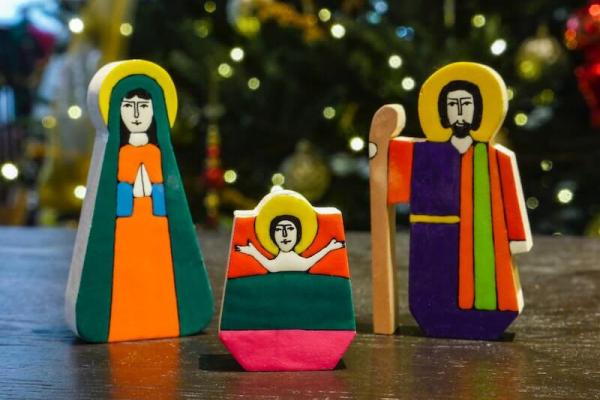We don’t know much about Jesus’ entrance into the world. For all the blockbuster movies, theatrical retellings, and creative adaptations, the New Testament authors give little detail regarding the timeline and context of these events. The following is an act of imagination. It is an attempt to fill in the gaps that are left for us in this story to bring the text to life. My hope is that this could be used as a resource for family Christmas Eve devotions or for congregations looking to creatively imagine the birth of Christ.
***
In those days a decree went out from Caesar Augustus that all the world should be registered. This was the first registration and was taken while Quirinius was governor of Syria. All went to their own towns to be registered (Luke 2:1-3).
Sarah used more focus to sweep her home than most butchers use when cutting with a knife. Every bit of dirt was swept away by her broom as she prepared the house for the guests coming to town for the census. She needed to preoccupy her mind. She couldn’t begin to think about what would happen when they came. Miryam, on the other hand, was looking forward to guests coming and was “helping” her aunt Sarah with the chores. Miryam was doing more talking than helping, but Sarah didn’t mind. That is, until Miryam began asking questions.
“Are they staying here?” asked Miryam.
Sarah coyly responded, “Who?”
Miryam stared blankly at her. “Joseph and Mary.”
Sarah didn’t hesitate: “No.”
“But the census … they’ll need somewhere to stay.”
“If Joseph wants somewhere to stay, he will leave her behind.”
A chasm seemed to open up between the two.
Miryam composed herself. “But, we don’t know whose child that is. She says that she’s been faithful. Why would she lie?”
Sarah, stared off into the distance, quietly remembering the Law, “You shall not commit adultery …” She continued cleaning before answering. “Because she knows what happens to women like her. Mary will lie and Joseph will believe her, but we will have no part of it. You must remember that we are God’s chosen people. We are set apart for the world to see. What would it look like for us to welcome in a woman who has been unfaithful to our own flesh and blood?”
“But her story … an angel? What about Elizabeth? Who would make this up? Maybe the Mes—”
“DON’T! You wouldn’t dare believe the Messiah would come to us in this way!” Her anger caught Miryam off guard. A pregnant silence settled into the house. After a moment, Sarah continued, now more gently. “What would our people do with an infant? We need a king. Look outside. Rome counts our heads so they know how much money they’ll profit from our taxes. They bring the entire world to them so they can throw our children into battle, dull swords in hand. They’ll never let us forget about the power they wield over us. How would a baby change that? If you’re seeking the Messiah, look up to the clouds where Elijah was taken to heaven. That is where our salvation will come.”
Joseph also went from the town of Nazareth in Galilee to Judea, to the city of David called Bethlehem, because he was descended from the house and family of David. He went to be registered with Mary, to whom he was engaged and who was expecting a child (Luke 2:4-5).
“They’re here!” exclaimed Miryam.
“Both of them?” Sarah asked with surprise, even though she knew they were coming.
“Yes. She’s really pregnant. Are you sure they can’t stay here, Aunt Sarah?”
With her back to both Miryam and the busy road just outside the home, Sarah replied firmly, “I’m sure.”
“The whole caravan is helping her unload their things. It must’ve been such a difficult journey.”
“I’m sure it was.”
“They’re heading this way. Just the two of them.”
Voices sounded from the entrance.
“Peace, mother,” a ragged Joseph said. “This is Mary, my wife.” Even through his exhaustion, Sarah could see his pride. He loved her. He believed her.
Sarah sighed a sigh of relief and disappointment. Relief because her son was home; disappointment because she felt her faith was being tried and she was uncertain if she’d pass the test.
“Peace to you, my son. It has been so long. You look tired.”
“Joseph! Mary!” Miryam shouted as she pushed her small frame into the entrance.
“Cousin!” Joseph exclaimed, bending down with open arms to receive her.
Mary and Sarah faced one another for the first time. “This woman,” Sarah thought to herself. Their eyes met for a moment and Sarah was briefly overcome with loving kindness. She looked away, back to Joseph. Mary’s hands rested on her belly.
“Has anyone else arrived?” Mary asked Sarah.
“No. You’re the first, Mary,” she replied without breaking eye contact with Joseph.
Sarah was searching for something; she was searching for a sign — a sign that Joseph didn’t believe in all this mess, a sign that he knew Mary had humiliated him. She couldn’t find what she was looking for. She felt herself becoming incensed.
Sensing his mother’s anger, Joseph asked, “Should we put our things in the guest chamber, mother?”
“No, no. The kataluma is occupied.”
Joseph had been given the runaround before. He was a carpenter by trade and although he was “uneducated” by society’s standards, he could tell when someone was trying to give him a bad deal. He had imagined Mary’s pregnancy would be difficult for his mother to accept, but her callousness and lack of compassion were unexpected. “What do you mean?” he confronted her. “You just said we were the first ones here. It has been such a long trip. There’s nowhere else for us to go. We just want to rest. Mary needs to rest.”
“It is occupied, Joseph. There is only room for one.” Sarah said, before thinking to herself: “Are they so determined to live in sin?”
Growing impatient, Joseph replied, “Well, which is it? Is it occupied or is there room? I will leave if there is only room for one!”
“Joseph, we can find somewhere else to stay,” Mary softly interjected as she placed her hand back over her womb, shielding her child from the dangers of this world.
Sarah agreed. “Perhaps that is best.” She could feel her facade beginning to break as her eyes welled with tears.
“There’s nowhere for them to stay, auntie,” Miryam explained as her short arms wrapped around Joseph’s waist. “Everyone is here for the census. It’s not safe, either. The Romans are everywhere.” Miryam was wise beyond her years.
Lost in her own thoughts, Sarah remembered all of the times Joseph had been hounded by the Romans growing up. She considered these things in her heart. “Fine,” she finally conceded. “If you insist she stays here, then you can go below.” This was insulting, and Sarah knew it, but she felt her heart giving way and she was convinced that if she gave in she’d be failing the test.
“To the animals!?” Joseph replied, indignant.
“Unclean for the unclean,” she replied. She resolved to harden her heart.
And she gave birth to her firstborn son and wrapped him in bands of cloth and laid him in a manger, because there was no place in the guest room. … When the angels had left them and gone into heaven, the shepherds said to one another, “Let us go now to Bethlehem and see this thing that has taken place, which the Lord has made known to us.” So they went with haste and found Mary and Joseph and the child lying in the manger (Luke 2:7; 15-16).
Sarah and Miryam ate dinner in silence. The two empty spots, reserved for Joseph and Mary, screamed louder than any of the words that could have been shared. Then came real screaming — the pains of childbirth rang throughout the house. Sarah wept. She questioned her actions, unsure if it was God’s command or her own anger that had sent her own son and his pregnant wife to the basement with the livestock. She considered going down to help, but her pride kept her away.
Many hours later, deep into the night, Mary’s shouts of pain turned into the soft wailing of a newborn child.
To her surprise, Sarah heard a sound at the door. Wiping away her tears she asked through the door, “Who is there?”
“Peace, peace,” a voice responded. “We are shepherds who have come to see the child.”
Miryam exclaimed, “They’re here to see Mary's baby!”
“To see her child?” Sarah replied. “Why would they come all this way to see a child?”
“Don’t you see, aunt Sarah? Remember what the prophet Isaiah said: ‘For a child has been born for us, a son given to us; authority rests upon his shoulders ...’ Maybe this is that child? What if Mary wasn’t lying? Maybe Mary’s child is the one who will save us?”
Strange as it was, Sarah invited the shepherds in and directed them to Mary and Joseph.
“Miryam, make our guests comfortable,” she instructed.
Sarah listened intently to the conversation below. The shepherds were explaining how they knew about the child:
“...and these heavenly beings surrounded us singing about this child! They said he is the Messiah born in the city of David…”
“I knew it!” Miryam interrupted. “He is here. Everything is going to change.”
As the shepherds continued, Sarah made her way to the basement. She was going down to see her grandson; she was going down to see her Messiah.
***
It is easy to miss God’s presence among us when we are consumed with anxiety, fear, and anger in the face of oppression. For Sarah, her pursuit of holiness initially blinded her to the presence of the Messiah. As we continue to seek justice in our world today, we should expect to find the presence of Christ in unexpected places (Matthew 25:31-46). May we have the eyes of Miryam to see God at work in the world and follow the Spirit in bringing good news to the poor, liberation to the captive, sight to the blind, and freedom to the oppressed.
Got something to say about what you're reading? We value your feedback!







